| |||||
| Decades: | |||||
|---|---|---|---|---|---|
| See also: | |||||
The following lists events that happened during 2015 in the Hashemite Kingdom of Jordan .
| |||||
| Decades: | |||||
|---|---|---|---|---|---|
| See also: | |||||
The following lists events that happened during 2015 in the Hashemite Kingdom of Jordan .
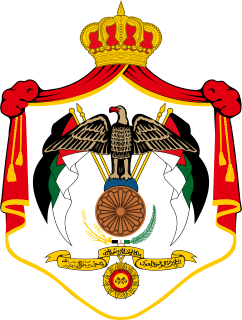
The politics of Jordan takes place in a framework of a parliamentary monarchy, whereby the Prime Minister of Jordan is head of government, and of a multi-party system. Jordan is a constitutional monarchy based on the constitution promulgated on January 8, 1952. The king exercises his power through the government he appoints which is responsible before the Parliament.

The history of Jordan refers to the history of the Hashemite Kingdom of Jordan and the background period of the Emirate of Transjordan under British protectorate as well as the general history of the region of Transjordan.

Abdullah II bin Al-Hussein is King of Jordan, reigning since 7 February 1999. He is a member of the Hashemite dynasty, the royal family of Jordan since 1921, and is considered a 41st-generation direct descendant of Muhammad.

Abdullah I bin Al-Hussein was the founder and ruler of the Jordan from 11 April 1921 until his assassination on the 20th of July 1951. He was the Emir of Transjordan, a British protectorate, until 25 May 1946, after which he was the king of an independent Jordan. As a member of the Hashemite dynasty, the royal family of Transjordan/Jordan since 1921, Abdullah was a 38th-generation direct descendant of Muhammad.
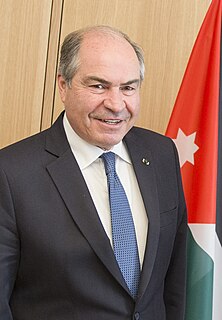
Hani Fawzi Mulki is a Jordanian politician that held several ministerial and diplomatic positions, and he was Chief Commissioner of the Aqaba Special Economic Zone Authority before his designation as Prime Minister by King Abdullah II and approval by the House of Representatives on 29 May 2016.

The 2005 Amman bombings were a series of coordinated suicide bomb attacks on three hotel lobbies in Amman, Jordan, on 9 November 2005. The explosions at the Grand Hyatt Hotel, the Radisson SAS Hotel, and the Days Inn started at around 20:50 local time at the Grand Hyatt. The three hotels are frequented by foreign diplomats. The bomb at the Radisson SAS exploded in the Philadelphia Ballroom, where a Jordanian wedding hosting hundreds of guests was taking place. The attacks killed 57 people and injured 115 others.
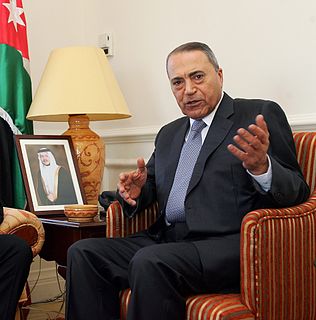
Marouf Suleiman al-Bakhit is a Jordanian politician who was twice Prime Minister. He first served as Prime Minister from 27 November 2005 until 25 November 2007 and then again from 9 February 2011 to 17 October 2011. Bakhit also held the position of Jordanian ambassador to Israel and the national security chief. Appointed as Prime Minister by King Abdullah II less than three weeks after the 2005 Amman bombings, Bakhit's main priorities were to maintain security and stability in Jordan. He was reappointed as Prime Minister by the King on 1 February 2011, following weeks of protests.

Hussein bin Abdullah is Crown Prince of Jordan as the son of King Abdullah II. As a member of the Hashemite dynasty, the royal family of Jordan since 1921, he is a 42nd-generation direct descendant of the prophet Muhammad.
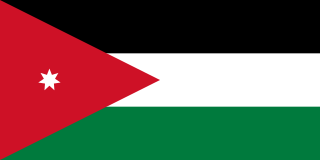
Jordan, officially the Hashemite Kingdom of Jordan, is a country in Western Asia. It is situated at the crossroads of Asia, Africa and Europe, within the Levant region, on the East Bank of the Jordan River. Jordan is bordered by Saudi Arabia to the south and east, Iraq to the northeast, Syria to the north, and Israel, West Bank of Palestine, and the Dead Sea to the west. In the southwest, it has a 26 km (16 mi) coastline on the Gulf of Aqaba in the Red Sea. The Gulf of Aqaba separates Jordan from Egypt. Amman is Jordan's capital and largest city, as well as its economic, political, and cultural centre.

The Parliament of Jordan is the bicameral Jordanian national assembly. Established by the 1952 Constitution, the legislature consists of two houses: the Senate and the House of Representatives.
Israel–Jordan relations are the diplomatic, economic and cultural relations between Israel and Jordan. The two countries share a land border, with three border crossings: Yitzhak Rabin/Wadi Araba Crossing, Jordan River Crossing and the Allenby/King Hussein Bridge Crossing, that connects the West Bank with Jordan. The relationship between the two countries is regulated by the Israel–Jordan peace treaty in 1994, which formally ended the state of war that had existed between the two countries since the establishment of the State of Israel in 1948, and also established diplomatic relations, besides other matters. Relations between the countries get strained from time to time, usually over tensions at the Al-Aqsa mosque. On 8 October 2020, Israel and Jordan reached an agreement to allow flights to cross over both countries’ airspace.

The Jordanian protests were a series of protests in Jordan that began in January 2011, and resulted in the firing of the cabinet ministers of the government. In its early phase, protests in Jordan were initially against unemployment, inflation, corruption. along with demanding for real constitutional monarchy and electoral reforms.

The 2016 FIFA U-17 Women's World Cup was the fifth edition of the FIFA U-17 Women's World Cup, the biennial international women's youth football championship contested by the under-17 national teams of the member associations of FIFA. The tournament was held in Jordan from 30 September to 21 October 2016.
The following lists events from the year 2011 in Jordan.
The following lists events that happened during 2010 in Jordan.
The following lists events that happened during 2005 in Jordan.
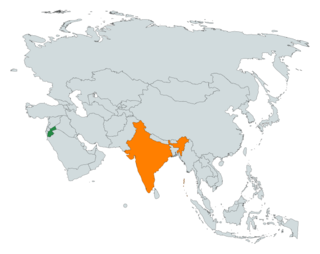
The Republic of India and the Hashemite Kingdom of Jordan signed their first bilateral agreement for cooperation and friendly relations in 1947. The agreement was formalized in 1950, when India became a republic, and full diplomatic relations were established between the two countries.

The 2018 Jordanian protests started as a general strike organized by more than 30 trade unions on 30 May 2018 after the government of Hani Mulki submitted a new tax law to Parliament. The bill followed IMF-backed austerity measures adopted by Mulki's government since 2016 that aimed to tackle Jordan's growing public debt. Although Jordan had been relatively unscathed from the violence that swept the region following the 2011 Arab Spring, its economy had taken a hit from the surrounding turmoil and from an influx of a large number of Syrian refugees into the country. Jordan also hosts a large contingent of Iraqi and Palestinian refugees, further straining its finances. The UNHCR places Jordan as the world's second largest host of refugees per capita.
The 2019–20 Arab Club Champions Cup knockout stage began on 20 August 2019 and ended on 21 August 2021 with the final at the Prince Moulay Abdellah Stadium in Rabat, Morocco, to decide the champions of the 2019–20 Arab Club Champions Cup. A total of 32 teams competed in the knockout stage.